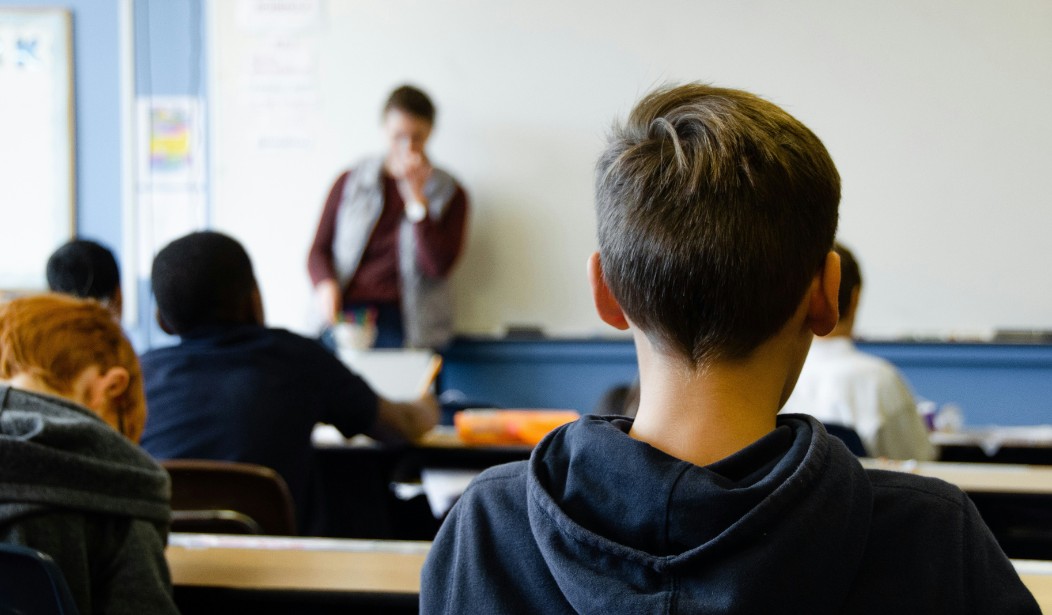School choice isn't an idea whose time has come. School choice is an idea whose time came a long time ago, and states and municipalities that are fighting against school choice are doing parents and students a grave disservice.
Of course, there's a problem with implementing this good idea: The teachers' unions. The unions have the Democratic Party in their back pocket and will resist to the finish any attempt at education reform. But in some states, that finish would seem to have arrived, because school choice is making some inroads, mostly in red states. Meanwhile, test scores in the union-controlled states aren't anything to write home about - presuming the students can write.
One new study illustrates the growing gap between two such states: Arkansas and California.
First, California:
Recently released scores on California’s state tests in English and math show huge proportions of students failing to achieve proficiency in the basic subjects.
More than half of California students taking the 2025 state English exam failed to score at the proficient level. On the state math test, more than six out of 10 test-takers failed to score at the proficient mark.
Test scores did tick slightly upwards from 2024 to 2025, which gave State Superintendent of Public Instruction Tony Thurmond the opportunity to boast of “boosted student proficiency in many areas.”
California students, as noted, have recovered slightly from being locked in their rooms during the COVID mess, which was a disaster for K-12 education in general. But they have recovered only slightly, and the teachers' unions still have California students firmly in their grasp.
Sadly, most California students in low-performing public schools have no exit ticket and are therefore forced to receive poor quality education in what amounts to government failure factories.
Then, there's Arkansas. Arkansas has opened what appears to be a voucher program, giving parents more choices as to where to send their kids to school, while subjecting education to the competitive forces that improve the outcomes of the process.
For example, a new report on Arkansas’ Education Freedom Accounts program has found “encouraging indicators on family satisfaction, retention, and student performance.”
According to the report, authored by researchers at the University of Arkansas Department of Education Reform, the two-year-old EFA program “empowers families to make the best educational choices for their children by providing financial resources for eligible students to attend an approved private school or homeschool.”
And here are the results; interestingly, homeschooled kids did better than kids attending brick-and-mortar schools.
According to University of Arkansas Professor Patrick Wolf, one of the authors of the report, “In our data on the second year of Arkansas’ EFA program, we saw promising student academic outcomes.”
Wolf and his co-authors found: “On average, EFA students scored at the 57th percentile in math and the 59th percentile in [English language arts], meaning they outperformed 57% of students nationwide in math and 59% in ELA on nationally norm-reference assessments.”
A norm-referenced test compares how certain students perform in comparison to other students taking the same exam, with the comparison expressed as a percentile rank.
Of particular note, “Home school EFA students scored at the 63rd percentile in math and 68th percentile in ELA.”
Wolf concluded, “Arkansas’ EFA program is providing families with meaningful choices and students are showing strong academic results.”
Parents obviously are viewing Arkansas' program as a success. Enrollment is up from 5,548 when the program was implemented in the 2024-2025 school year, to 14,256 in the 2025-2026 school year. 91 percent of students are sticking with the program.
That's a success by any measure.
For the record, California spends over $18,000 per student, per year; Arkansas, a little over $13,000, including presumably all costs, faculty, materials, and infrastructure.
The best idea, of course, would be to get the government out of the education process completely. At least, remove the federal government, which, in any case, has no constitutional authority to be involved in education at all. President Trump has made this a part of his agenda for his second term, and it can't happen fast enough. States can be involved, but these things should really be handled at the municipal or county level. In most cases, it is the city or county (borough, here in Alaska) that runs the schools in any case, but the various states, the federal government, and the teachers' unions all have to stick their oar in the water.
An educational approach that works for kids in Brooklyn may not work for kids in Tallahassee; what works in Tallahassee may not work in San Diego, and what works in San Diego may not work in Kotzebue.
Decentralize education. Give control back to the parents. Let parents decide where their kids should go to school. Break up the government-school monopoly. It's failing our students, and it's failing their parents. If programs like Arkansas' Education Freedom Accounts can give that process a kick-start, then that's a good thing - and it's proving, in any case, that competition isn't just good for the widget industry, it's good for schools, too.
It is the purpose of the educational process to produce young adults with marketable skills. Reading, writing, and mathematics are the foundation of that. Our schools can do better. Our schools have to do better. Breaking up the government monopoly works, as we've seen before, as we see again now.













